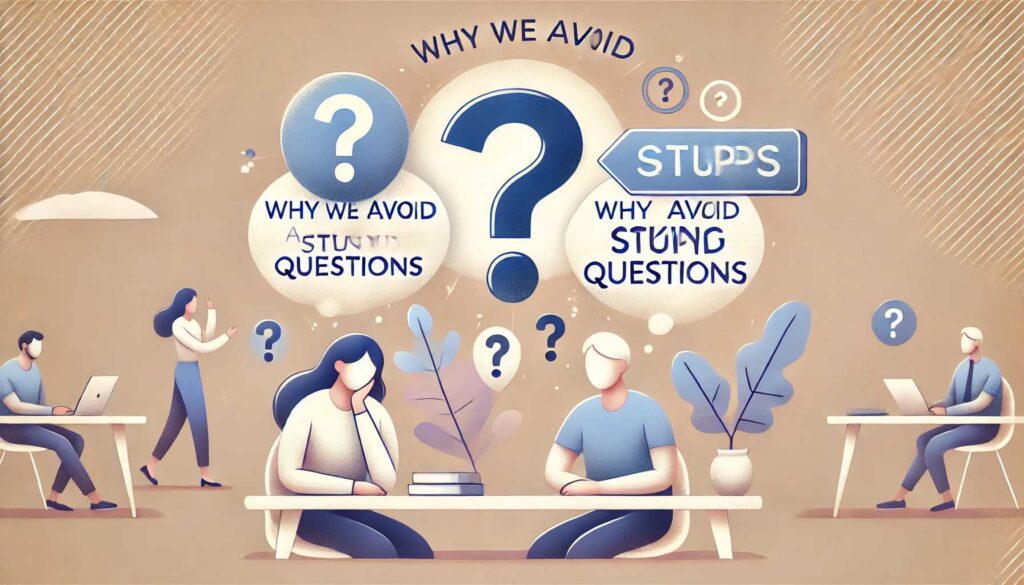We’ve all been there—hesitating to ask a question because we’re afraid it might sound “stupid.” Maybe it’s in a meeting, a classroom, or even a casual conversation. But here’s the thing: what we often dismiss as a “stupid question” can lead to surprising insights, deeper understanding, and even innovative ideas.
In reality, asking “stupid” questions isn’t a weakness—it’s a superpower. By daring to ask what others won’t, you open the door to unexpected benefits that can transform your learning, creativity, and connections.
Why We Avoid Asking Stupid Questions

The fear of asking “stupid” questions usually comes down to one thing: judgment. We worry about looking uninformed, inexperienced, or even foolish.
But this fear is often misplaced. More often than not, the questions we hesitate to ask are the ones others are silently wondering about, too. By asking, you’re not only helping yourself—you’re giving others permission to learn alongside you.
The Unexpected Benefits of Asking Stupid Questions
1. They Clarify What’s Unclear

Sometimes, we pretend to understand something just to avoid asking a question. But confusion doesn’t disappear—it grows. Asking even the simplest question can bring clarity, not just for you, but for everyone around you.
Example:
In a meeting, asking, “Can you explain what this term means?” might seem basic, but it ensures everyone is on the same page.
Why It’s Powerful:
Clarity eliminates misunderstandings and builds a stronger foundation for deeper conversations.
2. They Challenge Assumptions

“Stupid” questions often disrupt the status quo by challenging assumptions that everyone else is taking for granted. These questions can spark innovative ideas or uncover overlooked problems.
For more tips on spotting hidden opportunities, explore: How to Train Your Mind to See Opportunity in Every Problem
Example:
When someone asked, “Why don’t we just deliver packages with drones?” it might have sounded far-fetched, but it led to groundbreaking innovations in logistics.
3. They Foster Curiosity

Curiosity is the starting point of all learning. Asking simple questions, even if they seem obvious, reignites curiosity and helps you explore topics from a fresh perspective.
How It Helps:
A beginner’s mindset—asking “Why?” or “How?”—helps you uncover new insights, even in areas you think you already understand.
4. They Build Confidence Over Time

The more you practice asking questions, the more comfortable you become with seeking knowledge. What feels like a “stupid” question at first becomes a confident inquiry as you realize the value of your curiosity.
Pro Tip:
Start small. Ask questions in settings where you feel safe, then gradually push yourself to speak up in larger groups.
5. They Encourage Others to Speak Up

When you ask a question that others are too afraid to voice, you inspire them to do the same. Your willingness to be vulnerable creates a more open and collaborative environment.
Example:
In a group discussion, asking “Can someone explain this part again?” can break the ice, encouraging others to admit their own uncertainties.
Also Read: Why Struggling Is Good for You: The Science Behind Personal Growth
6. They Lead to Deeper Understanding

“Stupid” questions often dig deeper than surface-level answers. By asking, “Why does it work this way?” or “What happens if we try this instead?” you explore topics on a more meaningful level.
How It Helps:
Complex ideas often hide behind jargon or assumptions. Simple questions cut through the noise to uncover the core truths.
7. They Spark Innovation

Many groundbreaking ideas started with what seemed like a “stupid” question. By thinking outside the box and daring to ask the unconventional, you create space for new possibilities.
Example:
Questions like “Why can’t cars drive themselves?” or “What if we could video call from anywhere?” sounded ridiculous at first—but they led to technological revolutions.
How to Embrace Asking Stupid Questions

1. Reframe Your Mindset
Instead of seeing your question as “stupid,” view it as an opportunity to learn. Remind yourself that every expert was once a beginner.
Want to boost your creative side? Don’t miss: Unlock Your Creative Genius: How Daydreaming Fuels Innovation.
Mantra to Remember:
“There are no stupid questions, only opportunities to grow.”
2. Ask With Curiosity, Not Apology

Instead of prefacing your question with, “This might be a dumb question, but…” ask confidently: “Can you help me understand this part better?”
3. Focus on the Goal

The purpose of your question isn’t to impress—it’s to gain clarity, spark conversation, or explore new ideas. Keep your focus on the value of the answer, not how the question might sound.
4. Listen Actively

Asking questions is only half the equation—listening to the answers with an open mind helps you absorb and apply what you learn.
5. Practice in Everyday Life

Get in the habit of asking questions, even in casual settings. Whether it’s asking how a friend cooked a dish or why your coworker prefers a certain tool, curiosity sharpens your ability to ask meaningful questions.
What Happens When You Start Asking Questions

1. You Learn Faster
Instead of wasting time pretending to know something, you get the information you need to move forward.
2. You Build Deeper Connections
Genuine curiosity shows others that you value their knowledge and perspective, strengthening relationships.
For strategies on staying motivated and engaged, read: 7 Hidden Psychological Tricks to Motivate Yourself Instantly
3. You Become More Creative
Simple questions open the door to fresh ideas and unconventional solutions.
4. You Inspire Others
Your willingness to ask encourages others to speak up, fostering a culture of curiosity and collaboration.
Real-Life Examples of the Power of Stupid Questions

In Science:
Albert Einstein famously asked, “What would it feel like to ride on a beam of light?” This simple question led to the theory of relativity.
In Business:
Jeff Bezos once asked, “What if we could deliver anything to anyone, anywhere?” That question became the foundation of Amazon’s success.
In Everyday Life:
Someone who asks, “Why do we do it this way?” might uncover inefficiencies in a process, leading to improved workflows or solutions.
Final Thoughts
There’s nothing stupid about wanting to learn, grow, or think differently. The next time you hesitate to ask a question, remind yourself that curiosity is a strength, not a weakness.
Embrace the power of “stupid” questions. They’re often the ones that lead to the biggest breakthroughs, the deepest insights, and the most meaningful connections. Because when you dare to ask, you create opportunities to learn—and that’s never a stupid thing to do.
